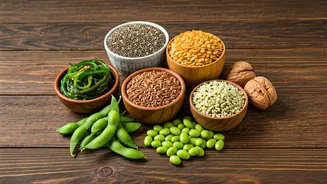Chia Seeds' Power
Chia seeds top the list, celebrated for their remarkable omega-3 content. These tiny seeds offer an excellent source of alpha-linolenic acid (ALA), a type
of omega-3 fatty acid crucial for heart health. They can be effortlessly added to your diet. Consider sprinkling them on yogurt, blending them into smoothies, or using them as a topping for salads. Beyond omega-3s, chia seeds deliver fiber, which aids in digestion and helps regulate blood sugar levels, contributing to overall well-being. Their versatility makes them a simple yet potent addition to your daily routine, supporting both heart health and general vitality. Include chia seeds in your breakfast cereal or as a snack to enjoy their full health benefits.
Flax Seeds: Heart Boost
Flax seeds, like chia seeds, are rich in ALA omega-3s, and offer a significant contribution to a heart-healthy diet. They are a versatile addition to any vegetarian meal plan, and should be consumed ground. Grinding them increases the body’s ability to absorb the nutrients. Sprinkle ground flax seeds on your breakfast cereal or use them in baking to enhance the omega-3 intake. Flax seeds also offer fiber, supporting digestive health. Regular consumption of flax seeds is associated with improved cholesterol levels, which benefits cardiovascular health. Make flax seeds a regular part of your diet for maximum benefits.
Walnuts: Brain & Heart
Walnuts stand out as a delicious way to boost omega-3 intake and promote brain health. They are one of the few nuts that are rich in ALA, making them an excellent choice for vegetarians seeking omega-3 sources. Eating walnuts can improve cognitive function, and contribute to heart health due to their beneficial fats. Incorporate walnuts into snacks, salads, or as a topping for your oatmeal. Their crunchy texture and rich flavor also make them an enjoyable addition to various recipes. Moreover, walnuts contain antioxidants, which are vital for protecting cells from damage, helping to protect both the heart and the brain from cellular damage.
Hemp Seeds: Versatile Choice
Hemp seeds provide a complete protein source, and a good source of omega-3 fatty acids. They contain both ALA and other essential nutrients such as magnesium and zinc. Hemp seeds have a mild, nutty flavor, which makes them easy to incorporate into a range of dishes. They can be added to smoothies, salads, or used in baking for an extra nutritional boost. Regular intake of hemp seeds can contribute to heart health and help provide a good amount of essential nutrients. Add these seeds to your diet for a nutritional and tasty boost.
Edamame: Soybean Power
Edamame, or young soybeans, is a nutritional powerhouse that can supply the body with ALA. They are a tasty snack and a protein-rich addition to meals. Rich in fiber, edamame supports digestive health and may improve cholesterol levels. It is an ideal addition to salads or as a side dish. The high protein content makes edamame a great choice for vegetarians. Include edamame as part of a balanced diet to benefit from its omega-3 content and other nutrients.
Seaweed: Ocean's Bounty
Seaweed, an often-overlooked source, provides a different type of omega-3s, EPA and DHA, commonly found in fish. Many varieties of seaweed, such as nori (used in sushi) and spirulina, provide valuable nutrients. It is a fantastic source of nutrients and is easy to include in your diet through sushi rolls, salads, or snacks. Seaweed offers a diverse range of nutrients that support cardiovascular health. Integrating seaweed into your diet is a simple method to get the benefits of omega-3s along with other vitamins and minerals, promoting overall well-being. Including seaweed in your meals will add both flavor and nutrients.
Brussels Sprouts: Greens' Omega
Brussels sprouts are a good source of ALA omega-3s. These vegetables also offer fiber, vitamins, and antioxidants. Steaming, roasting, or sautéing Brussels sprouts brings out their flavor, which complements a wide range of dishes. Besides the omega-3 content, Brussels sprouts are beneficial for heart health. Regular intake of Brussels sprouts helps to enhance the intake of essential nutrients and supports overall health, and is a great source of fiber. Consider Brussels sprouts as part of a balanced meal plan, to increase the omega-3 intake.
Kidney Beans: Versatile Choice
Kidney beans offer a modest amount of ALA, in addition to being a rich source of protein and fiber. These beans are incredibly versatile and can be added to various dishes, from stews and salads to soups. Their fiber content is great for aiding digestive health, which also has a positive effect on heart health. Kidney beans also support healthy blood sugar levels, contributing to overall well-being. Incorporate them into your diet to boost the omega-3 intake and provide essential nutrients for a healthy body.
Spinach: Leafy Goodness
Spinach provides some ALA omega-3s, alongside other essential vitamins and minerals. This leafy green is simple to add to salads, smoothies, or cook into meals. Spinach supports overall health with its numerous benefits and may help to improve cardiovascular health, with the support of its beneficial nutrients. Spinach is a great choice when looking for both omega-3s and other nutrients that are important for overall health. Include spinach as part of your balanced diet to enhance omega-3 intake and get essential nutrients.
Mustard Greens: Flavorful Omega
Mustard greens are rich in ALA omega-3s, and offer a slightly peppery flavor. These greens can be cooked or eaten raw in salads. Mustard greens provide fiber, vitamins, and antioxidants. Incorporating these greens into the diet supports cardiovascular health and enhances the intake of essential nutrients. Regular consumption is linked to better health due to its nutrient benefits. Incorporate mustard greens into your diet to boost omega-3 intake and provide essential nutrients for a healthier you.












